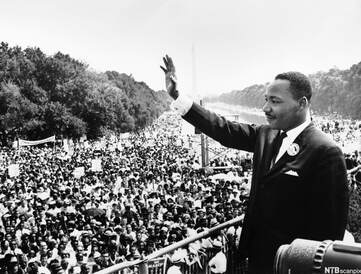 “You who are in the field of psychology have given us a great word. It is the word maladjusted. This word is probably used more than any other word in psychology…the word implies you are declaring that destructive maladjustment should be destroyed. You are saying that all must seek the well-adjusted life in order to avoid neurotic and schizophrenic personalities. But on the other hand, I am sure that we will recognize that there are some things in our society, some things in our world, to which we should never be adjusted…We must never adjust ourselves to racial discrimination and racial segregation. We must never adjust ourselves to religious bigotry. We must never adjust ourselves to economic conditions that take necessities from the many to give luxuries to the few. We must never adjust ourselves to the madness of militarism, and the self-defeating effects of physical violence.” Dr. Martin Luther King Jr, Invited Distinguished Address to the American Psychological Association, September 1 1967 As we honor Dr. King’s legacy today and his yet unfulfilled dream of racial equality and we pause to reflect on his leadership in the struggle for Black civil rights, we also remember his fight to oppose war and to end poverty. What we often neglect to consider is his groundbreaking moral philosophy and his ideas about how psychological and social changes are linked. His perspective is more relevant today than ever before.
In his speech to the American Psychological Association Dr. King put forth the concept of “Creative Maladjustment”, an idea that links the internal struggles of individuals to the social forces around them. There is no doubt that this concept comes in part from his own experience. Many have noted that he had an exceptional level of emotional sensitivity going back to childhood. He twice tried to commit suicide, once when he thought his grandmother had died and the second time when she actually died. That sensitivity, and the profound empathy that grew out of it, helped lay the foundation of his legendary leadership abilities. What he understood more than many members of his audience that day, was that mental illness and distress are not just symptoms of a kind of maladjustment that needs to be cured by getting the patient to “adapt”. He also understood that they could be the leading edge of a kind of insight and a guiding force on the road toward individual freedom and social equity. “Negroes have been oppressed for centuries not merely by bonds of economic and political servitude. The worst aspect of their oppression was their inability to question and defy the fundamental precepts of the larger society. Negroes have been loathe in the past to hurl any fundamental challenges because they were coerced and conditioned into thinking within the context of the dominant white ideology...For the first time in their history, Negroes have become aware of the deeper causes for the crudity and cruelty that governed white society's responses to their needs. They discovered that their plight was not a consequence of superficial prejudice but was systemic.” As mental health professionals, we see this every day in the consulting room with our patients. People often suffer and feel stuck in patterns of helplessness and self-blame. In behaviors and relationships, they enact their experience that things are bad, unfair, and out of their control. This would be the self-destructive side of maladjustment. Those who endure the effects of systemic injustice (poverty, racism, gender discrimination) carry an additional burden of anger and despair. To paraphrase Dr. King, the “worst part” of oppression and the greatest driver of suffering is the inability to name, appreciate, and oppose the systemic sources of those injustices. Mental health professionals have been rightly criticized for working to smooth out the edges of mental suffering and allow the patient to “adjust” to the norms of society. Not only does this fail to address the sources of illness, or provide true healing and growth, but it implicitly supports those social norms that are coercive and oppressive. There are divergent traditions in the mental health field that have long been critical of this “adaptive” approach and parallel Dr. King’s perspective. Rather than seeing the suffering individual as resulting from some uniquely internal problem, be it a chemical imbalance or a troubled soul that needs to be medicated or soothed, they seek out understandings of the individual’s relationship to and experience of the world (families, peer groups, institutions, culture, etc.). They recognize that we human beings constantly internalize, interpret, and make meaning of the world around us. What we do with those meanings makes all the difference. As Dr. King might advise, the role of the mental health professional might not only be to help patients elaborate those interpretations and meanings, but also to ask questions regarding the “fundamental precepts of society” not to instruct or educate them, but to open up new possibilities for thinking and feeling. By questioning the ways we deny or minimize pain in ourselves and those around us, and attending to the various sources of that pain we can become more “maladjusted” in a way that inspires creativity, that is to become open to new ways of seeing ourselves, our relationship to the world and become part of a greater movement toward social justice.
0 Comments
Your comment will be posted after it is approved.
Leave a Reply. |
Archives
April 2024
Categories |
